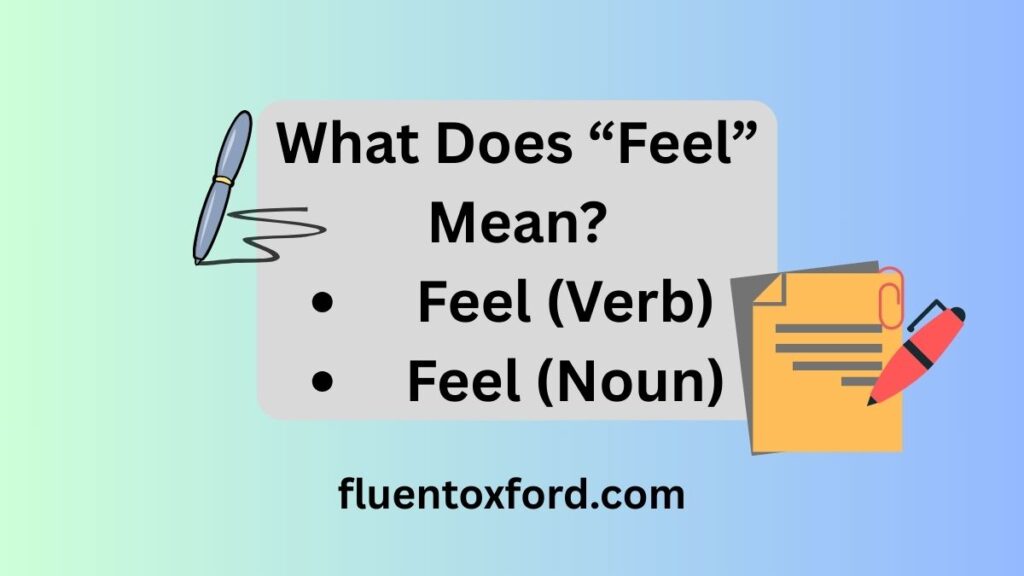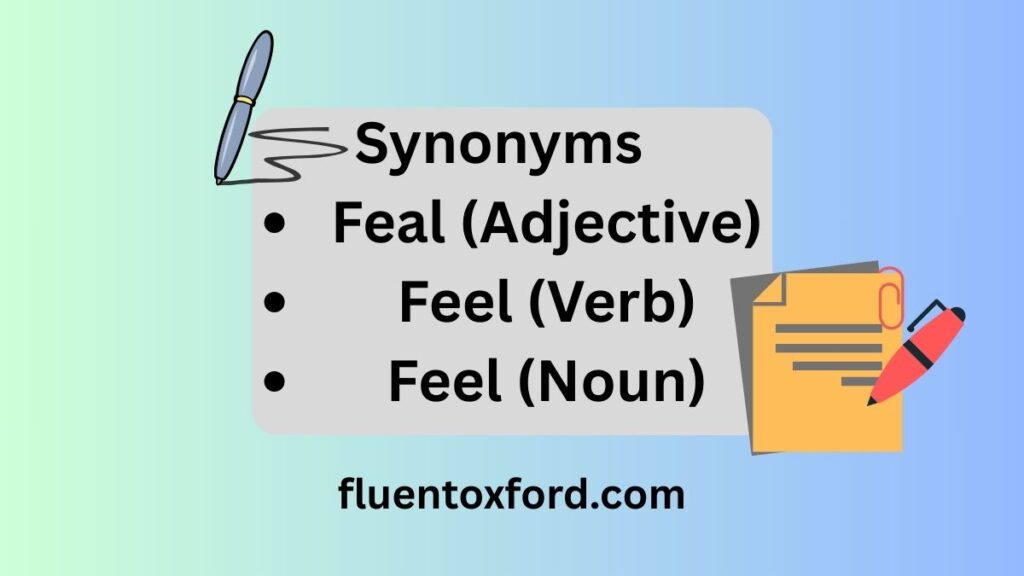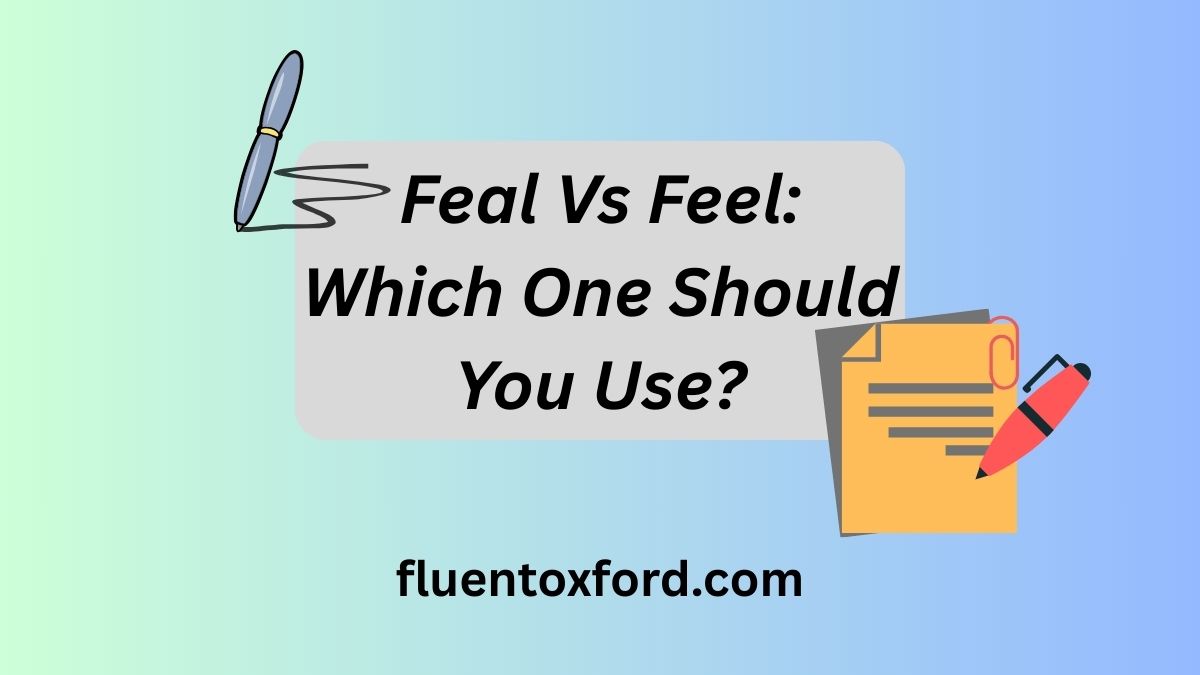“Feal vs. Feel: Which One Should You Use?” refers to the distinction between two similar-looking words where one is commonly used in modern English and the other is largely obsolete. Feel is a widely recognized verb and noun that relates to physical sensation or emotional experience. In contrast, feal is an archaic term meaning loyal or faithful, rarely seen outside of historical or poetic contexts. While they may appear visually similar, these words have entirely different meanings and usage in the English language.
In the age of autocorrect and instant messaging, even small spelling errors can change the meaning of a sentence. That’s what makes the confusion between “feal” and “feel” so intriguing. A single misplaced letter can shift your sentence from a heartfelt expression to an outdated word that most readers won’t recognize. This twist of language not only highlights the complexity of English but also entertains those who love to explore it.
Understanding the subtle differences between such words can elevate your writing and sharpen your communication skills. “Feal vs Feel” is more than a spelling issue—it’s a chance to delve into the fascinating evolution of English vocabulary. Whether you’re a student, writer, or language enthusiast, knowing which term fits best adds both clarity and style to your language use.
What Does “Feal” Mean?
The word feal is not common in modern English. It’s an archaic adjective that means faithful, loyal, or true. You’ll almost never hear it in daily conversations or find it in contemporary writing unless it’s used intentionally in a poetic or historical context.
Though rarely used today, “feal” was once common in medieval literature and poetry to describe steadfast devotion or allegiance. In some dialects of Northern England and Scotland, “feal” also referred to something smooth, soft, or cozy. Additionally, as a verb in certain dialects, “feal” meant “to hide” or “to conceal.”
For example:
“A feal servant to the crown, he never questioned his duty.”
It’s most often encountered in poetic contexts or older literature, where it evokes a sense of faithfulness and allegiance.
Modern Usage Status
- ✅ Recognized in older dictionaries
- ❌ Marked obsolete or rarely used
- ⚠️ Often flagged as a spelling error in spell-check tools
Origins and Etymology of “Feal”
Understanding where a word comes from helps us see how and when to use it. “Feal” comes from:
- Old French: feal or féal (meaning faithful, derived from Latin fidelis)
- Middle English: Adapted into English with the same meaning
In medieval literature, “feal” was often used to describe knights or servants who remained loyal to their lords. It carries a faithfulness context that ties deeply into historical texts and feudal relationships.
Example from Middle English:
“He was a feal knight to his leige, defending with valor and truth.”
What Does “Feel” Mean?

Unlike “feal,” the word feel is a staple in everyday language. It functions as both a verb and a noun, with applications in physical, emotional, and abstract contexts.
Feel (Verb)
To perceive by touch or to experience an emotion or sensation.
- “I feel the breeze on my face.”
- “She feels nervous about the exam.”
This relates to both sensory experience and emotional perception, making it feel a highly dynamic word. “Feel” is widely used in everyday language to express both emotional and physical experiences.
Feel (Noun)
A general impression or sensation.
- “The leather has a soft feel.”
- “This place has a cozy feel.”
Origins and Etymology of “Feel”
“Feel” traces back to:
- Old English: fēlan, meaning to touch or perceive by touch
- Germanic roots, related to sensory perception
Over centuries, “feel” expanded its meaning from just touch to include emotions, intuitions, and even metaphors—making it deeply embedded in the English language’s lexical semantics.
Feal vs Feel: Core Differences
Let’s break down the major differences between feal vs feel:
| Aspect | Feal | Feel |
| Part of Speech | Adjective (sometimes noun, archaic) | Verb and noun |
| Meaning | Loyal, faithful | Sense, perceive, experience |
| Usage | Archaic, poetic, historical | Modern, versatile, common |
| Recognition | Rarely understood by modern readers | Universally known |
| Context | Faithfulness context, loyalty | Sensory experience, emotional perception |
Is “Feal” Still Used Today?
Technically, yes—but barely.
“Feal” appears:
- In historical literature
- Occasionally in modern fantasy or poetic writing
- In linguistic studies or when examining archaic English
However, using “feal” in modern texts may confuse your audience. It’s generally recommended to avoid using “feal” in professional or casual writing unless you’re intentionally crafting a historical or stylized tone.
Dictionary Status
- Oxford English Dictionary: Feal listed as archaic
- Merriam-Webster: Not found as a modern word
- Collins Dictionary: Recognized with historical context
Synonyms and Related Words

Understanding synonyms gives us more vocabulary tools and improves clarity.
Feal (Adjective)
- Loyal
- Faithful
- True
- Steadfast
- Devoted
- Allegiant
- Constant
- Dutiful
- Dedicated
- Trustworthy
These words are more commonly used in modern English to express similar meanings.
Used to describe someone’s unwavering allegiance.
Feel (Verb)
- Sense
- Perceive
- Experience
- Detect
- Notice
- Touch
- Undergo
- Suffer
- Encounter
- Recognize
These express various forms of physical or emotional sensory experience.
Feel (Noun)
- Texture
- Vibe
- Impression
- Touch
- Sensation
- Emotion
- Feeling
- Impression
- Perception
- Sentiment
Describes both literal sensations and emotional perception.
Real-World Usage Examples
Feal in Context (Adjective)
“A feal companion through wars and peace, he never left my side.”
→ Here, “feal” evokes a deep sense of trust and loyalty.
Feel in Context (Verb)
“I feel the warmth of the fire.”
→ Sensory experience via touch.
“They feel anxious about the meeting.”
→ Emotional perception expressed.
Feel in Context (Noun)
“The fabric has a rough feel.”
→ Literal texture.
“This cafe has a welcoming feel.”
→ Emotional ambiance or impression.
Common Mistakes and Misconceptions
Many confuse feal vs feel because they are homophones—words that sound alike but differ in meaning and spelling. Here’s how to avoid common pitfalls:
- Autocorrect errors: Typing “feal” might just be a typo for “feel.”
- AI-generated content issues: Some tools mislabel “feal” as valid when it’s not suitable for modern usage.
- Overuse in fantasy writing: Writers sometimes use “feal” thinking it adds authenticity, but it may alienate readers if misused.
When and Why to Use Each Word
Here’s a helpful decision table:
| Situation | Use “Feal” | Use “Feel” |
| Writing a historical poem | ✅ | ❌ |
| Describing your emotions | ❌ | ✅ |
| Explaining physical sensations | ❌ | ✅ |
| Trying to sound old-fashioned | ✅ (with care) | ✅ |
| Everyday writing (blog, essay, email) | ❌ | ✅ |
| Fiction set in medieval times | ✅ | ✅ (as needed) |
Quick Reference Table
| Word | Part of Speech | Meaning | Modern Use? | Example |
| Feal | Adjective | Loyal, faithful | Rare/archaic | “A feal servant to his lord” |
| Feel | Verb/Noun | To sense or experience | Common | “I feel cold.” / “A soft feel” |
Linguistic Perspective: NLP and Homophones

From a natural language processing (NLP) perspective, this word pair is rich for analysis:
- Homophones like feal and feel are tricky for AI and humans alike.
- Word sense disambiguation helps determine the correct usage based on context.
- Tools like Grammarly or ChatGPT often rely on contextual usage and spell correction algorithms to identify when “feal” is mistakenly used.
Writing Tip: Improve Your Writing by Choosing the Right Word
Want to improve your writing instantly?
- Stick to “feel” unless you’re writing a period drama or epic fantasy.
- Don’t confuse homophones—they can ruin clarity.
- Use precise language: always choose the word that best fits the tone and era of your content.
As writer Mark Twain once said,
“The difference between the almost right word and the right word is really a large matter—it’s the difference between the lightning bug and the lightning.”
Case Study: The Word “Feal” in Fantasy Fiction
In The Lord of the Rings–style fantasy, some authors use “feal” to sound medieval. But without proper context, it feels forced.
Example:
“The feal warriors gathered at the gate.”
Soundsc, right? Maybe. But in most cases, “loyal warriors” does the job with less confusion.
Verdict:
Use “feal” only when your audience understands its tone and history. Otherwise, it’s better to stick with plain English.
Conclusion
In the end, Feal vs Feel: Which One Should You Use? It comes down to knowing the difference between old and modern English. Feel is the correct word in most situations today. It is used to describe emotions, touch, or experiences. Feal is a rare, old word that means loyal or faithful. Most people do not use it anymore, and it is not found in everyday writing.
So, when thinking about Feal vs Feel: Which One Should You Use?, the answer is almost always feel. It is simple, clear, and correct for modern communication. Knowing the difference helps you avoid mistakes and write better. Understanding words like these also makes your English stronger and more interesting. Keep learning, and you’ll use the right words with confidence.
FAQs
Q1. Is “feal” a real word in English today?
Yes, feal is a real word, but it’s archaic—rarely used in modern English except in poetry or historical writing.
Q2. Can “feal” be used instead of “feel”?
No, feal and feel are not interchangeable—feal means loyal, while feel relates to sensation or emotion.
Q3. Why does my spell-check mark “feal” as incorrect?
Because most modern dictionaries consider feal obsolete, it’s flagged as a potential misspelling of “feel.”
Q4. Which is more correct in everyday use: feal or feel?
Feel is correct for everyday language, emails, essays, and general communication.
Q5. Where is “feal” still used in 2025?
It appears in literature studies, medieval reenactments, or fantasy novels but is not standard in current formal writing.

As an admin at Fluent Oxford, Maida Queen is the driving force behind our vibrant learning community. With a deep passion for English language education, she ensures that our platform remains a dynamic, engaging, and supportive space for learners worldwide.
Maida expertly manages content, assists users with their grammar and fluency queries, and fosters an interactive environment where learning feels effortless and enjoyable. Whether you need guidance, motivation, or just a friendly face in the Fluent Oxford community, Maida is always there to help you reach your English language goals.








